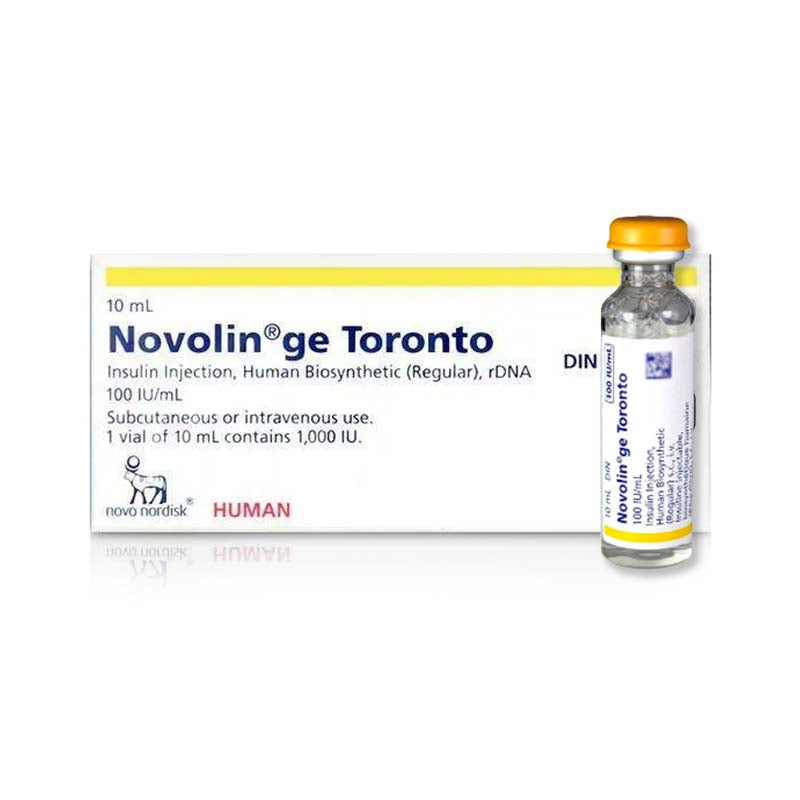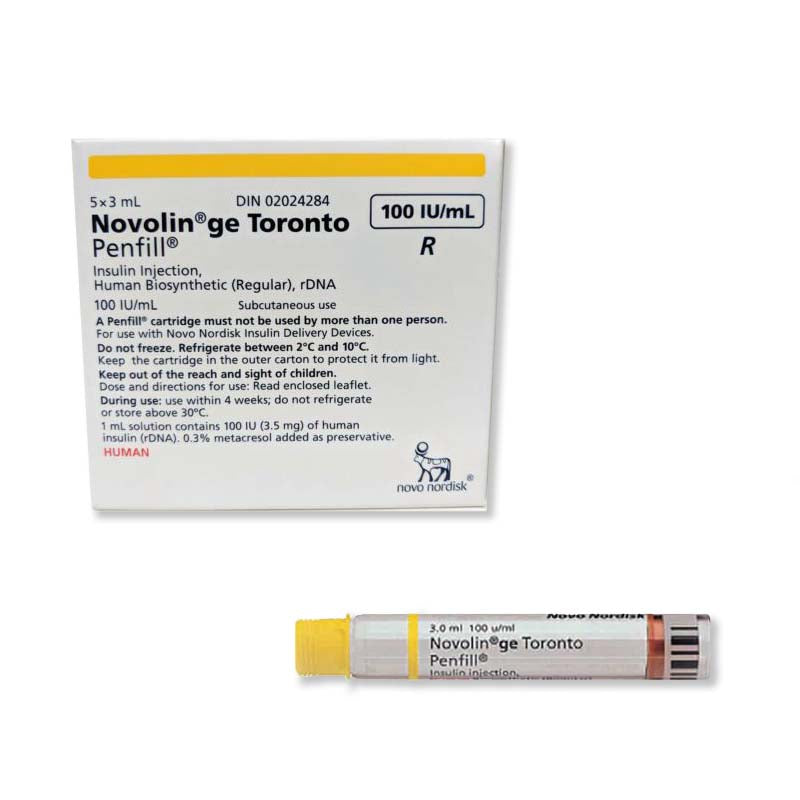NOVO NORDISK
Novolin R (Insulin Regular)
Novolin R (Insulin Regular)


Couldn't load pickup availability
What is this medication?
Insulin NPH/Isophane, Novolin NPH/Novolin N/Humulin N
Intermediate Acting Insulin
Insulin NPH/Isophane, Novolin NPH/Novolin N/Humulin N is indicated for diabetes mellitus types 1 and 2. It is also prescribed off-label for gestational diabetes.
How does this medication work?
Insulin NPH/Isophane, Novolin NPH/Novolin N/Humulin N works on liver, muscle and adipose (fat) tissue to regulate the metabolism of carbohydrates, protein, and fats. In the liver and muscles, it increases glycogen synthesis which is the immediate storage form of glucose. It increases fat production by increasing fatty acid release from the liver in the form of lipoproteins which adipose tissue converts to fatty acids then to triglycerides for storage whilst also stopping the metabolism of triglycerides (fat). Insulin also increases the cellular uptake of amino acids and some electrolytes such as potassium into the cell. In muscle tissue protein synthesis is increased.
Normally insulin is produced by the pancreas however insulin products for pharmaceutical use have been produced via recombinant DNA technology using certain bacteria (they splice the gene for insulin production into bacterial DNA so the cell produces insulin – a gene is a portion of DNA or RNA that produces one specific protein). NPH stands for neutral protamine Hagedorn named as it is regular human insulin in a neutral (N) solution mixed with protamine, which is a protein (P), and Hans Christian Hagedorn (H), an insulin researcher that helped discover it. The protamine and insulin form crystals which last far longer than normal human insulin and was the basal insulin.
How should I take this medication?
Insulin NPH/Isophane, Novolin NPH/Novolin N/Humulin N is an intermediate acting or basal insulin. It is given by subcutaneous injection in one, or more commonly, two daily injections. In type 2 diabetes someone usually starts around 10 units per day or 0.1-0.2mg/kg/day and the dosage is slowly increased until glucose control is achieved. In type 1 diabetes 40-50% of total daily insulin is given as intermediate or long acting with the rest divided into fast acting mealtime insulin. If converting from another insulin the number of units given may need to be lowered as a precaution.
How to Take Insulin NPH/Isophane, Novolin NPH/Novolin N/Humulin N: Follow instructions provided by physician/pharmacy label, use consistently at same times each day unless otherwise directed, refrigerate product not in use (36-46 Fahrenheit, 2-8 Celsius), the vial in use may be kept at room temperature (below 86 Fahrenheit, 30 Celsius) for up to 28 days (discard if not used by this point). Invert the vial multiple times and roll between fingers (the number of times varies with brand) to mix prior to use. Inject generally into abdomen, thighs, buttocks, or arms with absorption rates varying from site to site. Be consistent with the part of body you inject into but rotate injection site to avoid redistribution of fat and excessive irritation to the area. For example, if you choose abdomen which is the most common, inject in circular order at least 2 inches from navel.
You Need to Avoid: Continue to mix if there is any sediment or clumps in the vial, it should appear uniformly cloudy or milky. Avoid injecting cold insulin as it may be painful.
What should I watch for while using this medication?
Before starting Insulin NPH/Isophane, Novolin NPH/Novolin N/Humulin N make sure your physician is aware of any allergies or medications you currently take, if you have had bariatric surgery, cardiovascular disease, have kidney disease, liver disease, are pregnant or breastfeeding.
What if I miss a dose?
Your doctor will tell you what to do if you miss a dose of insulin or miss a meal because of illness.
Since Humulin 70/30 is used with a meal, you may not be on a timed dosing schedule. Whenever you use this insulin, be sure to eat a meal within 45 minutes. Do not use extra medicine to make up a missed dose.
How should I store this medication?
Keep Humulin 70/30 in its original container protected from heat and light. Do not draw insulin from a vial into a syringe until you are ready to give an injection. Do not freeze insulin or store it near the cooling element in a refrigerator. Throw away any insulin that has been frozen.
Storing unopened (not in use) Humulin 70/30:
Refrigerate and use until expiration date, or store at room temperature and use the vial within 31 days, or use the injection pen within 10 days.
Storing opened (in use) Humulin 70/30:
Store the vial in a refrigerator or at room temperature and use within 31 days, or store the injection pen at room temperature (do not refrigerate) and use within 10 days. Do not store the injection pen with a needle attached.
What are the possible side effects of using this medication?
Peripheral edema, injection site reaction, hypoglycemia, hypokalemia, weight gain, hypersensitivity reactions, immunogenicity, atrophy at injection site peripheral edema, visual disturbances, etc.
Note- this is not a complete list of side effects and as this medication had been in use since before the strict clinical trial requirements of today, the frequency of occurrence is not defined. This medication has been in use since the 1940s and is generally very well tolerated with hypoglycemia being the largest concern as with all insulin.




